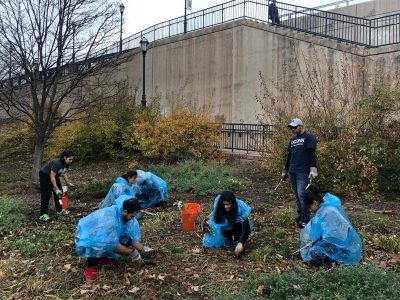
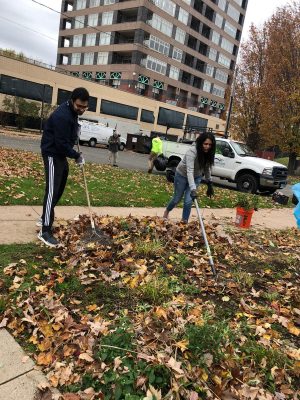


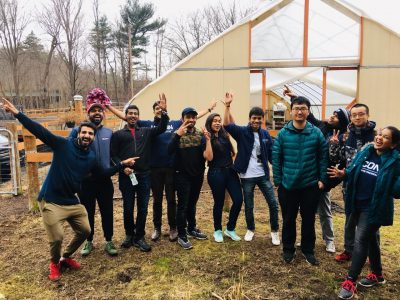
On March 15th, 2019, UConn’s Graduate Net Impact Chapter visited the Keney Park Sustainability Project (KPSP). KPSP intends to create the next generation of healthy, productive and environmentally conscious citizens.
15 Uconn Graduate students helped KPSP in removing dead plants and vegetate lettuce, spinach and cilantro seeds. Uconn students learn about the impact of the environment on mental, physical and spiritual health. And how the practice of sustainable techniques promotes a healthy symbiotic relationship between us and our environment.
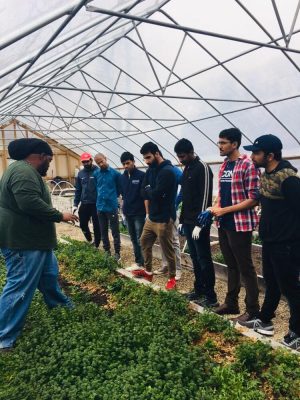
The Keney Park Sustainability Project goal is to support the development and sustainability of community-based food systems, i.e., farmers markets, community gardens, school-based gardening, agricultural project and home gardens. KPSP protect and preserve the 693-acre urban forest named Keney Park by providing individuals employable landscaping and forest management skills. As a result, it is creating the next generation of employable parks workers and Environmental Stewards.
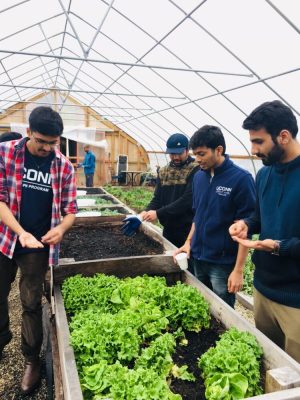
Projects of KPSP:
To find out more about Keney Park and get involved, visit https://www.keneyparksustainability.org/projects
Read on to find out what’s trending in sustainability around the world!
February 2020
January 2020
December 2019
November 2019
If there was any qu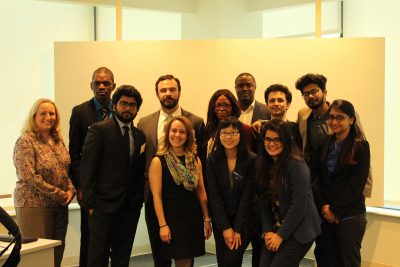 estion about how much heart and soul participants put into vying for the UConn Net Impact MBA Sustainability Case Competition victory, it could be measured by the disappointment on the faces of those who didn’t place.
estion about how much heart and soul participants put into vying for the UConn Net Impact MBA Sustainability Case Competition victory, it could be measured by the disappointment on the faces of those who didn’t place.
“This was an incredible competition in which every team gave its all,” said Allegra Klein, president and co-founder of the Net Impact graduate chapter at UConn, which strives to empower a generation to drive social and environmental change throughout their careers.
“The amount of passion that each team brought to the competition indicates the strong drive we all have for making the world a better place,” Klein continued. “I think everyone left with new friends, new business contacts, and a renewed sense of purpose.”
When members of the chapter, now in its second year, searched for regional competitions nearby, they couldn’t find any. So they created their own.
Nine teams participated in last week’s competition at the Graduate Business Learning Center in downtown Hartford, drawing graduate students from across the country and as far away as Hong Kong. Not only was the event extremely successful, it drew top sponsors, including United Technologies, Robinson & Cole, Cigna, and UConn’s Center for International Business Education and Research (CIBER).
The case competition challenged participants to measure the impact of one of United Technologies’ key philanthropic programs on the community, its employees and customers. Participants had one week to prepare their exhibits and their presentations were detailed and colorful. Among the judges were John Mandyck, chief sustainability officer at United Technologies, and Mary Tullis Engvall, director of Cigna Foundation, Civic Affairs & Corporate Responsibility.
The winning team hailed from University of Pittsburgh; second place went to Hong Kong University of Science and Technology, and the UConn team netted third place. The UConn challengers included Cody Broderick, Robert Budlong, Scott Crump and Holly Judge. Other teams came from University of New Haven, Clark University, Northeastern, UMass-Lowell, Drexel and Illinois State.
“The advantages of participating in a case competition are numerous,” Klein said. “We enjoy networking with students from diverse universities, as well as with potential employers, and we appreciate exchanging great ideas. It also reinforces our experiences with research, learning, and presentations—and spreads the word about corporate social responsibility. We accomplished what we set out to do and are already planning next year’s event.”
Budlong, a Part-time MBA student at UConn, said he was impressed by the senior-level executives who served as judges for the competition and was taking notes on how some teams stood out in their presentations.
“I’m excited about what I learned here. It was an awesome experience. When you’re put in a team and you pull together everything you know, that’s when you learn the most,” said Budlong, who works for the federal government. “It’s like football. You can study it all day but until someone puts that football in your hands, you haven’t learned the game!”
Judge, a Full-time MBA student set to graduate in May, won the best presenter award. Judge, who grew up overseas and spent a great deal of time in Australia, said sustainability was a fact of life growing up. She considers environmentalism a core part of life, and said she’s excited to see the CSR movement growing.
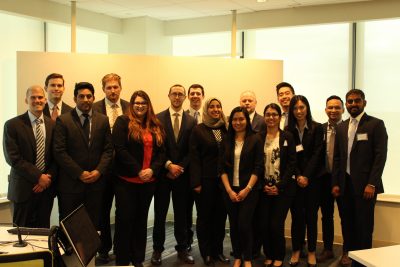
Mandyck, the chief sustainability officer at United Technologies and an adjunct faculty member at UConn, said he was very impressed to see the thought, care and creativity that the graduate students put into their work.
“It is a very pressing question of how to measure the value of these endeavors, and each team helped us think through it on our own,” he said.
He said UTC was excited to support the case competition because it reflects the company’s value of higher education and intellectual curiosity; it aligns with the company’s strong commitment to corporate social responsibility and sustainability, and it helps answer some of the pressing issues of evaluating the impact of doing what’s right in the workplace.
Meg Warren, director of the Full-time MBA Program, said the event surpassed her expectations in many ways.
“Case competitions are an invaluable way for students to gain practical experience outside the classroom while demonstrating such skills to the panel of judges who tend to be ’employers of choice.’ I also think these types of events are a great way for students to network with like-minded people from other programs. I watched many of them trading business cards while planning to keep in touch. Who knows where some of these students may cross paths again? And they’ll say they met at UConn,” she said.
“I am confident that this will be the first of many opportunities we will have to host students from other programs to compete here in Hartford,” Warren said. “It’s exciting to see many new initiatives happening in our capital city and to have the UConn graduate business students play a part in this is very special.”
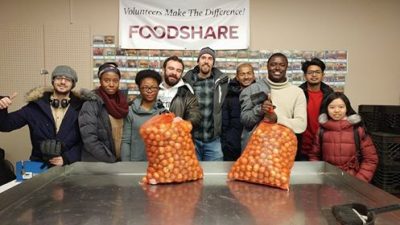 UConn’s Gradute Net Impact Chapter hosted a volunteer event with FOODSHARE (one of the largest food banks in Connecticut) on December 15th, 2017. As the region’s food bank, they work toward the vision of getting food donations from the food industry and distributing them to 300 food pantries, community kitchens, homeless shelters, and other partner programs.
UConn’s Gradute Net Impact Chapter hosted a volunteer event with FOODSHARE (one of the largest food banks in Connecticut) on December 15th, 2017. As the region’s food bank, they work toward the vision of getting food donations from the food industry and distributing them to 300 food pantries, community kitchens, homeless shelters, and other partner programs.
Nine UConn graduate business students were in attendance during the volunteer event. The FOODSHARE coordinator gave the students a brief about their facility in Hartford and how they accommodate to the needs of Connecticut. FOODSHARE has two main facilities in Connecticut, one is in Hartford and the other is in Bloomfield. These facilities have trucks that go out to numerous communities within Connecticut at least twice a week sharing and distributing food items such as apples, potatoes, other fruits, onions, tomatoes etc.
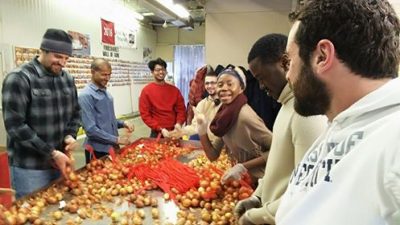
During thanksgiving week, they got over 10,000 turkeys as donations and this they distributed in the communities. These facilities ensure that they rotate trucks and have designated stops around the state. The food items that are share weekly is for anyone who needs food not necessarily the homeless. They just try as much as possible to give out to people that are present at their distribution locations. The people donating food can be anyone from large organizations, individual churches, etc.
FOODSHARE provides various volunteer opportunities to individuals to get their hands dirty, while helping our hungry neighbors.
If you’re ready to take action, join the Movement to Solve Hunger.
On October 13th, 20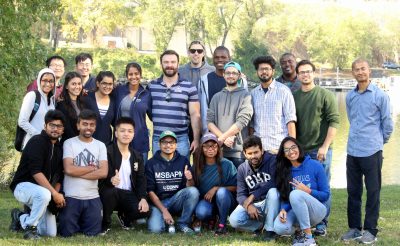 17, UConn’s Graduate Net Impact Chapter hosted a volunteer day for Riverfront Recapture, a non-profit organization that manages downtown Hartford’s riverfront park system.
17, UConn’s Graduate Net Impact Chapter hosted a volunteer day for Riverfront Recapture, a non-profit organization that manages downtown Hartford’s riverfront park system.
An enthusiastic group of 21 UConn graduate business students got their hands dirty working to maintain the riverfront parks, leveling and grading several paths in preparation for the Hartford Marathon the following day. While bringing UConn business students together to help their local community was one goal of the event, it was also an opportunity for volunteers to learn about the importance of the Connecticut River to the vitality and economic development of Hartford.
Established at the confluence of the Connecticut and Park Rivers in 1637, Hartford has a long and complicated relationship with its rivers. In the 1930’s, major flooding issues led to channelization of these rivers and the construction of a levee system. In the following decades, an interstate highway was built on top of these riverfront levees, effectively cutting off downtown Hartford from the Connecticut River.
Pointing to a series of floodwalls on either side of the Connecticut River, Chris Hayes, Director of Operations at Riverfront Recapture, explained how Hartford’s aging levee system is now in need of major reconstruction. Without significant improvements, downtown Hartford is at risk of major flooding. Property owners may soon be forced to purchase flood insurance.
Since the 1980’s, Riverfront Recapture has led the effort to improve the quality of life in Hartford by recapturing its riverfront property for the economic development of the city and the enjoyment of the public. The non-profit organization manages Hartford’s four riverfront parks, and has continuously expanded the footprint and accessibility of the parks while offering cultural events and recreational activities.
To find out more about Riverfront Recapture and get involved, visit www.riverfront.org.
April 10, 2017
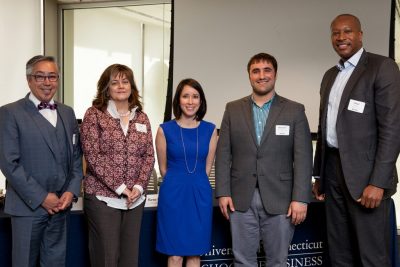 Daryl Shore‘s personal story silenced the crowd at the inaugural meeting of the new UConn graduate students’ Net Impact chapter, an organization of people eager to make a positive change in the environment and the world.
Daryl Shore‘s personal story silenced the crowd at the inaugural meeting of the new UConn graduate students’ Net Impact chapter, an organization of people eager to make a positive change in the environment and the world.
Shore, a manager in the Impact Investments Group at Prudential, talked about the need for affordable housing and how important it is to bolster it with good schools, grocery stores, transportation and jobs.
He talked about one of the biggest challenges, which is vying for land for affordable housing, when developers are trying to purchase the same city properties for luxury developments.
Then, someone asked the panelists why they became interested in corporate social responsibility. Shore said he grew up in North Philadelphia with two parents who were addicts. He experienced a period of homelessness before finding support and security from a school.
He went on to earn a bachelor’s degree in economics and political science at Emory University, an MBA in finance from Clark Atlanta University and a master of science in real estate at Johns Hopkins University.
“Quality housing can have a catalytic effect on a distressed community. I believe that if people have quality housing and quality neighborhoods, they don’t need to have wealthy parents. They need access to opportunity,” he said. “For me, having a job that impacts people’s lives is a dream job.”
The April 10 program, titled, “Careers for the Common Good: The Value of Sustainability in Business,” also featured four other guest panelists, including:
Allegra Klein, president of the Net Impact chapter at UConn, and a 2018 MBA candidate, said there is a sense of optimism and excitement about these topics among future executives. Some 50 attendees, primarily graduate students, attended the event at the Graduate Business Learning Center in downtown Hartford.
“There is a blossoming interest in sustainability among many people who want to ‘do good’ with their carer path,” she said. “Even if you’re not working directly in sustainability, there is a sense that you can still make a difference in whatever job you have.”
The business leaders urged the students to continually educate themselves about sustainability issues; to reach out to those who inspire them; to bring passion to their work, and to have the courage to challenge the status quo.
Bronin told the students that local efforts in sustainability and environmental protection are the next frontier, as dedication to climate issues has faltered on the federal level. She spoke of Hartford receiving a $350,000 grant to create a sustainability office to look at reducing energy use, enhancing green space, conserving water, disposing of waste and improving transportation options.
Deida spoke about how a company can use its core competencies to address a social need, while still achieving corporate goals. Consumers want to do business with companies that are socially responsible because they can trust them, he said.
Rochford, a UConn alumna, whose company delivers access to power, light and data to millions of residential and workplaces around the world, is responsible for advancing the company’s progress in setting and achieving sustainability goals. The company has cut its energy use by 40 percent and instituted strict eco-friendly standards for its suppliers—addressing everything from chemical use to recycling.
“We stay in front of what customers and stakeholders expect and it’s a very sincere commitment—something we take very seriously,” she said, adding that a strong corporate social responsibility plan attracts and retains talented employees.
Simmons-Telep, also a UConn alumnus, talked about the value of designing, implementing and assessing programs that support the growth and development of high-impact ventures.
Shore urged the students to use their analytical skills to translate their concerns and accomplishments to people who are less versed in sustainability.
“I thought it was incredible to see the different career paths that we can pursue with our newly minted business skills,” said MBA candidate and Net Impact member Josh Litwin. “Not only can we make an impact on a company’s bottom line but also on the community’s environmental and social needs. I thought it was interesting why the speakers took the career paths they did and many emotional reasons. It was really inspiring.”
Isaac Alawobu, a native of Ghana and a UConn MBA candidate, said he liked the different backgrounds and the common thread that connected the speakers.
“Sustainability and corporate social responsibility can connect every one. It’s a broad field for us to join, really without limitations,” he said. “I left here thinking that it is crucial to be creative, and always think about the common good.”
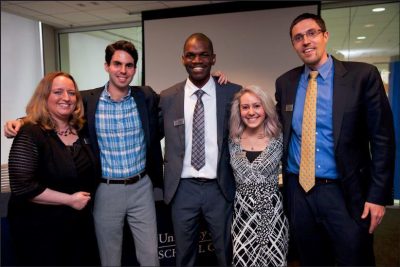 The University of Connecticut Net Impact Graduate Chapter started in Storrs in 2015 and moved the following year to Hartford. Our chapter’s goal is to meet the needs of UConn’s graduate students who want to become effective change agents through their careers. We are an official chapter of Net Impact, a global community of students and professionals who want to make a positive impact in the world. With over 100,000 members and 300 global chapters, Net Impact’s members strive to take on social challenges, protect the environment, and orient businesses and products toward the greater good.
The University of Connecticut Net Impact Graduate Chapter started in Storrs in 2015 and moved the following year to Hartford. Our chapter’s goal is to meet the needs of UConn’s graduate students who want to become effective change agents through their careers. We are an official chapter of Net Impact, a global community of students and professionals who want to make a positive impact in the world. With over 100,000 members and 300 global chapters, Net Impact’s members strive to take on social challenges, protect the environment, and orient businesses and products toward the greater good.
If you are enrolled as a graduate student (either full-time or part-time) at UConn, you are eligible to join. We meet monthly at the Hartford campus but welcome students from other campuses too. We have an exciting year of activities planned for 2017-2018, so please reach out to us at GradNetImpact@biz.uconn.edu and let us know you are interested!